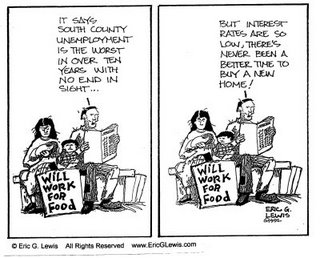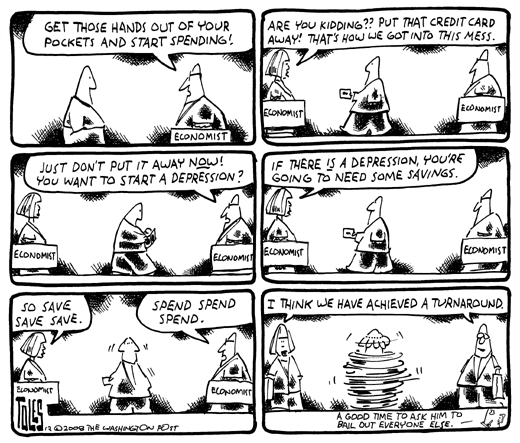
Against Monopoly
defending the right to innovate
Against Monopoly
Monopoly corrupts. Absolute monopoly corrupts absolutely.
Copyright Notice: We don't think much of copyright, so you can do what you want with the content on this blog. Of course we are hungry for publicity, so we would be pleased if you avoided plagiarism and gave us credit for what we have written. We encourage you not to impose copyright restrictions on your "derivative" works, but we won't try to stop you. For the legally or statist minded, you can consider yourself subject to a Creative Commons Attribution License.
current posts | more recent posts | earlier posts
Booklist
[Posted at 01/31/2009 11:01 AM by David K. Levine on Against Monopoly  comments(0)]
comments(0)]
Live Blog
[Posted at 01/23/2009 10:52 AM by David K. Levine on Against Monopoly  comments(1)]
comments(1)]
Microsoft
The central thing however is that free software, commoditized software, has caught up to proprietary software in quality, and is likely to increase the lead over time. Nobody is going to tinker or experiment with computer systems when orders are flowing through the door. But in a recession, there isn't much to lose, there tends to be a lot of slack as nobody want to lay off more people than absolutely necessary - so it's a good time to experiment with cheap software. In general innovation picks up a lot during recessions. I expect a lot of businesses will be trying linux and openoffice, and its market share will increase substantially.
Here is the prediction I'm hesitant about. Always in the past when software with substantial installed base has finally been supplanted the fall has not been gradual: Lotus and Wordperfect went from world-beaters to also rans in just a few years. I think Microsoft may surprise us by falling equally fast. There may not be much left in two years time.
[Posted at 01/22/2009 09:36 AM by David K. Levine on Against Monopoly  comments(6)]
comments(6)]
Hayek on Patents and Copyrights
From Individualism and Economic Order (ironically under copyright), Chicago, 1948, pp. 113-14.
Where the law of property is concerned, it is not difficult to see that the simple rules which are adequate to ordinary mobile "things" or "chattel" are not suitable for indefinite extension We need only turn to the problems which arise in connection with land, particularly with regard to urban land in modern large towns, in order to realize that a conception of property which is based on the assumption that the use of a particular item of property affects only the interests of its owner breaks down There can be no doubt that a good many, at least, of the problems with which the modern town planner is concerned are genuine problems with which governments or local authorities are bound to concern themselves. Unless we can provide some guidance in fields like this about what are legitimate or necessary government activities and what are its limits, we must not complain if our views are not taken seriously when we oppose other kinds of less justified "planning."
The problem of the prevention of monopoly and the preservation of competition is raised much more acutely in certain other fields to which the concept of property has been extended only in recent times. I am thinking here of the extension of the concept of property to such rights and privileges as patents for inventions, copyright, trade-marks, and the like. It seems to me beyond doubt that in these fields a slavish application of the concept of property as it has been developed for material things has done a great deal to foster the growth of monopoly and that here drastic reforms may be required if competition is to be made to work. In the field of industrial patents in particular we shall have seriously to examine whether the award of a monopoly privilege is really the most appropriate and effective form of reward for the kind of risk-bearing which investment in scientific research involves.
Patents, in particular, are specially interesting from our point of view because they provide so clear an illustration of how it is necessary in all such instances not to apply a ready-made formula but to go back to the rationale of the market system and to decide for each class what the precise rights are to be which the government ought to protect. This is a task at least as much for economists as for lawyers. Perhaps it is not a waste of your time if I illustrate which have in mind by quoting a rather well-known decision in which an American judge argued that "as to the suggestion that competitors were excluded from the use of the patent we answer that such exclusion may be said to have been the very essence of the right conferred by the patent" and adds "as it is the privilege of any owner of property to use it or not to use it without any question of motive." (Continental Bag Co. v. Eastetn Bag Co., 210 U.S. 405 (1909). It is this last statement which seems to me to be significant for the way in which a mechanical extension of the property concept by lawyers has done so much to create undesirable and harmful privilege.
[Posted at 01/16/2009 02:53 PM by Stephan Kinsella on Against Monopoly  comments(0)]
comments(0)]
James Watt: Monopolist
Was James Watt's patent of the steam engine a crucial incentive needed to trigger his inventive genius, as the traditional history suggests? Or did his use of the legal system to inhibit competition set back the Industrial Revolution by a decade or two? Here is a case study--by the authors of a wonderful new work on patents and copyrights--in how "intellectual property rights" do grave damage to the market economy. FULL ARTICLE
[Posted at 01/16/2009 02:50 PM by Stephan Kinsella on Against Monopoly  comments(0)]
comments(0)]
A Cartoon From 1992

[Posted at 01/02/2009 09:25 AM by John Bennett on Against Monopoly  comments(0)]
comments(0)]
Is there a maximum IQ requirement to be a state governor?
A year ago, the Oregon Department of Transportation announced it had demonstrated that a new way to pay for roads via a mileage tax and satellite technology could work.Now Gov. Ted Kulongoski says he'd like the legislature to take the next step.
As part of a transportation-related bill he has filed for the 2009 legislative session, the governor says he plans to recommend "a path to transition away from the gas tax as the central funding source for transportation."
Let's see. There are two alternatives here for increasing revenue in the face of more fuel efficient vehicles: 1. raise the gas tax. 2. introduce a complicated vehicle tracking technology to have a mileage tax. Disadvantages of the mileage tax:
**encourages gas guzzling vehicles - check
**raises serious privacy concerns - check
**probably won't work that well - check
**reduces the user fee on heavy vehicles that impose more wear and tear on the highway - check
What are the advantages exactly?
Update: you can find a bit more information here. One possible benefit of the new system is it could be used to implement congestion charges - mileage charges that depend on traffic or time of day. However, that doesn't seem to be the plan.
[Posted at 12/30/2008 01:38 PM by David K. Levine on Against Monopoly  comments(2)]
comments(2)]
Who Is the Monkey?

The villagers, seeing that there were many monkeys around, went out to the forest and started catching them. The man bought thousands at $10 and, as supply started to diminish, the villagers stopped their effort. He next announced that he would now buy monkeys at $20 each. This renewed the efforts of the villagers and they started catching monkeys again.

Soon the supply diminished even further and people started going back to their farms. The offer increased to $25 each and the supply of monkeys became so scarce it was an effort to even find a monkey, let alone catch it! The man now announced that he would buy monkeys at $50 each! However, Since he had to go to the city on some business, his assistant would buy on his behalf. In the absence of the man, the assistant told the villagers: "Look at all these monkeys in the big cage that the man has already collected. I will sell them to you at $35 and when the man returns from the city, you can sell them to him for $50 each."

The villagers rounded up all their savings and bought all the monkeys for 700 billion dollars. They never saw the man or his assistant again, only lots and lots of monkeys! Now you have a better understanding of how the WALL STREET BAILOUT PLAN WILL WORK !!!!
[Posted at 12/29/2008 05:33 PM by John Bennett on Against Monopoly  comments(0)]
comments(0)]
Our Continuing Series of Holiday Cartoons

[Posted at 12/16/2008 09:03 AM by John Bennett on Against Monopoly  comments(0)]
comments(0)]
More Important Crisis Information

[Posted at 12/11/2008 07:45 AM by John Bennett on Against Monopoly  comments(0)]
comments(0)]


Most Recent Comments